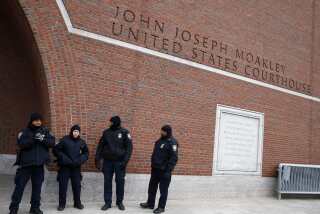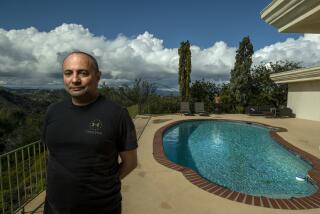‘Young Reformers’ Targeted in Moscow Embezzlement Probe
- Share via
MOSCOW — Prosecutors were closing in Wednesday on a group of former top-level government officials, often labeled “young reformers,” who allegedly received property illegally through the state privatization program they helped run.
Alfred Kokh, President Boris N. Yeltsin’s former privatization chief, was charged Tuesday with embezzlement for allegedly accepting a government-owned apartment in central Moscow.
At least three other former officials of Yeltsin’s administration--including one who held the post of privatization chief before Kokh--will be charged with a similar crime in coming days, a spokesman for the Moscow prosecutor’s office said Wednesday.
With public confidence in Yeltsin’s leadership already faltering, the growing scandal threatens to undermine members of his new Cabinet and Prime Minister Sergei V. Kiriyenko, just as they assume their posts.
One Russian newspaper, Kommersant Daily, reported that former First Deputy Prime Minister Anatoly B. Chubais--one of Yeltsin’s closest advisors--personally intervened to help at least some of the officials obtain their apartments in a newly constructed building not far from the Kremlin.
The newspaper, citing unnamed sources, also reported that Yeltsin was briefed in March by Prosecutor General Yuri Skuratov on the status of the investigation, shortly before the president fired his entire Cabinet, including Chubais.
In the meeting with Skuratov, the newspaper said, Yeltsin agreed to let the case against Kokh and the other former officials proceed as long as prosecutors spared Chubais--the mastermind of Yeltsin’s reelection campaign and economic program.
Kommersant Daily is controlled by banker Alexander Smolensky, part of a group of wealthy businessmen that opposes Chubais and uses its formidable media empires to attack him at every opportunity.
Chubais, 42, was appointed over the weekend to head one of Russia’s biggest companies, the government-controlled Unified Energy Systems electricity monopoly. In the past, Chubais has defended Kokh, his longtime associate, as “honest,” but he has not responded to the latest charges.
Svetlana Petrenko, a spokeswoman for the Moscow prosecutor’s office, said she had no comment on the purported involvement of Chubais. But charges will be filed soon, she said, against former privatization head Sergei G. Belyayev, former Federal Bankruptcy Commission Chairman Pyotr P. Mostovoi and former Chubais spokesman and aide Arkady Yevstafyev.
“Similar charges will be brought against some other owners at the apartment house, including Mostovoi, Yevstafyev and Belyayev,” she said.
Prosecutors said that apartments in the building were purchased by the State Property Committee--headed at different times by Belyayev and Kokh--and then redistributed. More than a dozen apartments were illegally transferred to private owners, prosecutors charge.
Kokh, 37, faces up to 10 years in prison if he is convicted.
Chubais, Mostovoi and Kokh were among a group of “young reformers” who were tainted by a scandal last year over payments of at least $90,000 they each received to write a book on the privatization process. The book was never published. The payment came from a company linked to the powerful Uneximbank corporation--a successful bidder last fall in the government auction of the giant Svyazinvest telecommunications company.
Kokh, who received $100,000 for his part in the book, was forced from his privatization post last summer before word of the book contract became public. At the time, he was under criticism for favoritism in selling off state assets.
Prosecutors are still investigating the book advance payments. It is unclear whether the apartment deal surfaced in that investigation or is part of a separate probe.
In disclosing the charges against Kokh on Tuesday, Moscow’s chief prosecutor, Sergei Gerasimov, said Kokh had been ordered to stay in Moscow. But a day later, the prosecutor acknowledged that Kokh had left the country with the permission of his office.
“Kokh’s whereabouts are known, and he has gone abroad with the permission of the Moscow prosecutor’s office,” Gerasimov said. “Kokh repeatedly returned from abroad when summoned by the Moscow prosecutor’s office [in the past], and we see no problem now.”
The willingness of prosecutors to let Kokh leave the country prompted speculation that he is cooperating with investigators.
More to Read
Sign up for Essential California
The most important California stories and recommendations in your inbox every morning.
You may occasionally receive promotional content from the Los Angeles Times.













